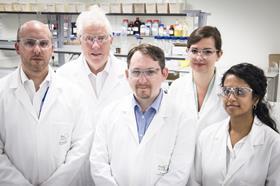
A London company has come up with a pioneering solution to help businesses minimise the impact of plastic on the environment.
Polymateria, a start-up based at the Imperial College Innovations I-Hub in London, has developed a range of drop-in additives for plastic products and packaging that cause them to biodegrade over time.
Earlier this year, a report published by US academics –the first global analysis of mass-produced plastics – found that 8.3 billion tonnes of plastic have been produced since the 1950s, most of it ending up in landfill or oceans. Closer to home, the use of plastic packaging made headlines recently after former Asda CEO Andy Clarke said supermarkets should reject plastic packaging and promote alternative materials.
Polymateria’s time-controlled biodegradation technology provides packaging manufacturers with a cost-effective way to make plastic biodegradable without affecting its intrinsic properties. A customised blend of additives is added to the plastic during the manufacturing process. It remains dormant for a set timeframe, after which the additives get to work, reacting with the oxygen in the air to break up the polymer chains. What remains is a powder that is “eaten” by naturally-occurring fungi and microbes, leaving carbon dioxide and water.
“Our technology allows plastics processors to programme the life of a plastics product so that it can have a shelf-life and use life, but if it escapes into the environment as a fugitive plastic – as litter for example – it will break down and completely biodegrade,” explains Polymateria’s chief scientific officer Dr Graham Chapman. “It is a drop-in additive that can be added to the normal plastics process without altering the properties of the plastic article and does not require any additional investment on the part of the processor.”
The system has a number of applications within the fruit and vegetable industry – it can be used in retail packaging such as punnets and flow-wrap, and also for some of the protective packaging used to transport produce, including trays, film and shrink wrap. The company is also working on providing biodegradable solutions for agriculture applications, including mulch film that breaks down in the soil so that the farmer no longer has to remove it.
Rather than supplying the final manufactured plastic product, Polymateria sells its technology through licencing agreements with packaging manufacturers, delivering bespoke solutions in the form of masterbatch additives. The company has developed a range of products for the international fruit and vegetable industry, and Chapman envisages that this sector of the market will account for a large part of its sales volume in the medium to long term.



